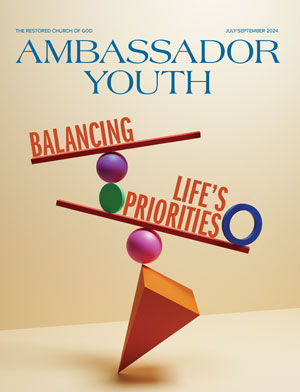Imagine juggling a dozen tasks at once, each screaming for your attention. Sounds familiar, right? For many teens and young adults like you, this is not just an occasional thing—it is pretty much what every day looks like.
Some might say your generation is lazy, but that is far from the truth. You are caught in a whirlwind of responsibilities—schoolwork, after-school clubs, hanging out with friends, part-time jobs, not to mention the ever-present world of tech. Without setting some priorities, things can get overwhelming and lead to stress or even worse.
During my time working with teens as a parent and a minister, I have seen some common pitfalls young people can fall into. Consider a few scenarios. As you read, you might be able to think of a time when these applied to you.
Imagine a student trying to ace her exams while managing a bunch of other tasks. She can find herself spending too much time on non-test-related things, leaving hardly any time to focus on what is important—her studies. Sadly, this approach can lead to less-than-stellar grades and tons of anxiety.
Or think about a boy who signs up for every club and sport. It seemed like a great idea at the time, but not picking and choosing which to participate in has resulted in burnout. There is hardly any time left for hanging out or studying, and both performance and health can take a hit.
Think of another boy getting bogged down in the digital world. Hours spent scrolling through social media or chatting eat into his homework and study time. This means cramming late into the night, not getting enough sleep and struggling to focus the next day. This cycle has led to more stress and overall unhappiness.
Finally, a girl is in the tricky situation of balancing a part-time job with her studies. She has tried to do both without a plan, which led to falling behind on schoolwork, rushing to meet deadlines, and even taking unnecessary risks at work. This recipe for disaster makes her afraid she will fail at everything.
Chances are, you have found yourself in one or more of these scenarios and know exactly how it feels. Without setting some clear priorities, it is easy to feel swamped and stressed—like a hamster on a wheel. Constant unease can make anyone feel out of control and less motivated.
But here is some good news: This is not a new problem, and there is ancient wisdom that can help.
Yes, I am talking about the Bible. It might seem a bit unexpected for many teens, but you know God’s Word is full of timeless advice that can really help put things into perspective and manage your life better.
By applying several biblical principles, you can neatly organize your daily activities and it will help you lead a more fulfilling and prosperous life.
The Bible Helps You Prioritize
In Psalm 119:105, it says this: “Your word is a lamp unto my feet, and a light unto my path.” On our own, you may feel your life is a bit all over the place, and the Bible can help you know what to focus on first. It lights the way forward with practical tips for organizing your life, setting your priorities straight, and finding a sweet balance in your daily hustle and bustle.
Here is the foundational importance of setting your priorities: “Seek you first the Kingdom of God, and His righteousness; and all these things shall be added unto you” (Matt. 6:33).
This verse is all about prioritizing. It emphasizes putting spiritual goals and values first. It tells everyone that pursuing eternal life in the Kingdom of God should be at the top of their list of most important things to do. This comes with a promise from God that He will help you, even as a teen or a young adult. Also note the phrase “these things.” This refers to what was discussed earlier in the chapter: a person’s physical needs such as food, clothing and shelter.
By prioritizing your relationship with God and aligning your goals with His will, other parts of your life will fall into place. Seeking God’s Kingdom brings clarity to school, work, friends, how you spend your free time and much more. It comes down to making the right decisions that will please God.
What does pursuing the Kingdom look like? You can take the first 15 minutes of your morning to dive into a Bible passage or review an Ambassador Youth article and consider how you can apply that to your day’s activities. Rituals such as these can sharpen your focus on what is most important and clear the fog for the day’s priorities.
When young, King Solomon did a stellar job setting priorities. Solomon had a chance to ask God for riches and honor, but instead, he prioritized an understanding heart to make good decisions. As a result, God granted his request and much more.
Let’s read the account: “And God said unto him, Because you have asked this thing, and have not asked for yourself long life; neither have asked riches for yourself, nor have asked the life of your enemies; but have asked for yourself understanding to discern judgment; behold, I have done according to your words: lo, I have given you a wise and an understanding heart…And I have also given you that which you have not asked, both riches, and honor: so that there will not be any among the kings like unto you all your days” (I Kgs. 3:11-13).
Talk about being rewarded for having the right priorities!
Understanding, wisdom and guidance are essential. Godly wisdom is like having a spiritual GPS for decision-making. Whether through daily prayer, a deep dive into scripture or a chat with someone you look up to in the Church, look for ways to develop godly thinking and apply it to your decisions and goals.
On top of this, be sure to approach the tasks you prioritize with zeal and commitment: “Whatsoever you do, do it heartily, as to the Lord, and not unto men” (Col. 3:23). Whatever you do, pretend you are doing it for God rather than a parent, teacher or employer. That changes things, does it not?
Decide to give your all, whether you are taking on a big project or just doing routine tasks. This principle should also be applied when deciding what is most important in your life. Working hard on something that you put very little thought into is not a good thing.
A zealous mindset is about striving for excellence and fully committing to whatever you are doing, big or small. This can apply to study, work, serving others and more. Make sure to focus entirely on the task at hand, avoiding distractions such as being on your phone, scrolling through social media or daydreaming. Put your heart into all that you do, as the biblical King Hezekiah did in his work. Read II Chronicles 31:20-21. This mindset will empower you to accomplish what you want.
Another crucial principle for setting priorities is the practice of tithing. Proverbs 3:9-10 provides a key verse: “Honor the Lord with your substance [wealth], with the firstfruits of all your increase: so will your barns will be filled with plenty, and your presses will burst out with new wine.”
By giving a tenth of our earnings to God first, we demonstrate our willingness to fulfill what He requires of us. Tithing is our way of acknowledging that everything we have comes from God, who enables us to earn money. Giving 10 percent of our income is a way to honor God, build trust and show gratitude for all we have. When tithing, we are being kind and generous, choosing to help others with our resources before we think about our own needs.
We also must trust in God for guidance in all our decisions—including setting priorities: “Trust in the Lord with all your heart; and lean not unto your own understanding. In all your ways acknowledge Him, and He will direct your paths” (Prov. 3:5-6). These verses came just before the ones about tithing. This concept not only provides the confidence needed to give 10 percent of your income but also puts other challenging life decisions in perspective.
When people trust in their own understanding, they go with what feels right and usually do the same things they have always done. This is a recipe for getting stuck in ruts and never improving one’s circumstances.
Trusting God to direct your paths means believing that He will guide you in making the right decisions, including what to prioritize in your life. This takes humility, as it is an admission that you do not have all the answers. But that is OK. No one knows everything, even adults. Ask God for guidance, read His Word, seek spiritual counsel when needed, and trust the nudge of the Holy Spirit when you feel it. Know that God has your back and is leading you in the right direction.
Finally, you should recognize that there is a time for everything when it comes to prioritizing. The book of Ecclesiastes states, “To everything there is a season, and a time to every purpose under the heaven” (3:1). Reading further in the book shows that there are highs and lows in life, which we need to be prepared for (vs. 2-8). Sometimes you need to work hard, and other times, it is all right to relax. Neither state lasts forever. Recognizing and respecting these “seasons” helps you focus on what needs your attention the most at any given time.
By integrating these principles into your life, you will navigate your days with more clarity and purpose. Having a clear plan of action reduces anxiety and allows you to tackle tasks systematically.
Use Goal Setting to Your Advantage
Setting goals goes hand-in-hand with setting priorities. Without a target or destination, you are wandering aimlessly. Think of goals as your personal roadmap, coming in three levels: short, medium, and long.
“Without setting some clear priorities, it is easy to feel swamped and stressed—like a hamster on a wheel. Constant unease can make anyone feel out of control and less motivated.”
For immediate wins, short-term goals are your best friend. Use them to nail down what needs to be ticked off your list today or this week. You may decide to wake up at 6:00 a.m. every weekday morning to go for a run or do some pushups and sit-ups to stay in shape. This daily goal is short-term, but it will lead to long-term benefits. And why not sprinkle in some fun when approaching your day or your week? Treat getting everything done like a game. If you complete everything on your task list, you win!
Medium-term goals are a bit more ambitious. These are the projects you aim to accomplish in the coming months or within the year. Break these big goals into smaller, manageable pieces and celebrate each little victory along the way. You can even break down the smaller goals within these medium-term goals into short-term ones.
For example, if improving your grades by the end of the semester is your goal, you could create a weekly and monthly plan for each subject. Keeping track of your progress will make it easier to adjust your plans as needed.
Finally, long-term goals are like dreams you are working toward, whether they relate to your career or your personal development. To make these dreams a reality, it is good to sketch out the steps you will need to take. A long-term goal is graduating high school or college or learning to play the piano well. Remember, achieving these goals takes time—it is more of a marathon than a sprint.
To succeed, find mentors and friends who can offer advice and support along your journey. If you are eyeing a specific career, start laying the groundwork now by getting the right qualifications and building a network of contacts. When it comes to being baptized someday, consider it the culmination of what you are learning and applying in your life right now.
Balancing your life is like orchestrating your personal symphony, blending academics, work, hobbies and rest into a harmonious melody. Be sure to weave in moments for spiritual growth and quiet reflection. A planner or planner app can be your maestro, helping you schedule time for different activities and ensuring there is always a pause for relaxation and spiritual nourishment.
Remember to set boundaries. Learn to say no to activities that do not align with your priorities or that overextend you. Prioritize what matters most to you. If you are invited to an event that clashes with your plans, politely decline. This may be because of work, a prior commitment to a project or simply feeling worn out and tired. Getting rest can be a priority too! There is no need to neglect what is important, you can always participate next time.
Do not hesitate to adjust your life to maintain balance. Regularly review your priorities and commitments to ensure they match your goals and values. What works for you at one time may need to be temporarily changed. Modify your schedule as needed to stay on track. A good approach is to take time during the weekly Sabbath to reflect on your week, celebrate wins, find areas of improvement and recalibrate for the week ahead.
By incorporating these extra tips and steps, you can effectively juggle various responsibilities while keeping biblical concepts at the center of it all.
Success Stories
Remember our examples from earlier? Now imagine the person in each scenario after they took steps to improve by applying what we learned.
The student who once felt swamped by assignments and exams, struggling with managing her time and decisions, has found a new way forward. Now, she starts her day with prayer, looking to God for guidance and wisdom. She has learned to prioritize, tackle the most important tasks first and trust in God’s direction. By setting aside time for spiritual reflection each morning (Matt. 6:33), she is now much calmer and more focused. This change has helped her manage her time better, improve academically and maintain a sense of peace and purpose.
The teen boy who used to eagerly join multiple clubs, sports teams and volunteer groups without prioritizing and became overcommitted and burnt out is now guided by the principle of doing everything with wholehearted effort (II Chron. 31:20-21). This means he now selects a few key activities that align with his long-term goals, setting clear boundaries and saying no to overextending himself (Ecc. 3:1-8). By focusing his energy on fewer commitments, he excels in his activities, maintains good grades and enjoys a more fulfilling life.
The young man who used to spend hours on social media, resulting in late-night study sessions and not enough sleep, has decided to cut back on screen time, choosing to prioritize his day with wisdom from the Bible. Spending time reading God’s Word before bed helps him wind down and fall asleep with the right mindset. He is balancing study and relaxation to improve his grades, sleep better and feel more fulfilled.
Lastly, the girl juggling a part-time job and college, who used to struggle with punctuality and underperforming, is now striving to trust God completely (Prov. 3:5-6). She has organized her schedule to better balance her work and study. Also, by managing her finances wisely and tithing (Prov. 3:9-10), she has found a better harmony in her life, leading to improved performance at work and school, less stress and a healthier lifestyle.
In each case, these individuals learned to set goals and make necessary adjustments in their lives. These stories show us the practical benefits of incorporating biblical wisdom into our daily routines. If they can do it, so can you!
Never forget the importance of seeking first the Kingdom of God, embracing wisdom, pouring your heart into your efforts, giving the first of your increase, placing your trust in God and understanding the timing for everything can significantly change how we approach our daily lives. Living according to Bible principles is not just a lofty idea—it is a practical method for crafting a life filled with achievement and success. We can handle life’s twists and turns by aligning our actions with these enduring truths.
You do not need to wait for a perfect time to start—kick off this journey today. Reflect on your current life priorities, pinpoint where to incorporate these biblical principles and pledge to embark on a path toward a brighter future.
Trust me, your future self will be incredibly grateful!


















